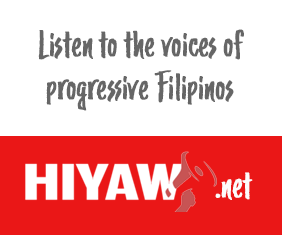At dawn today, Jovito Palparan Jr., a retired military general, wanted on charges of kidnapping and serious illegal detention, was arrested by the National Bureau of Investigation (NBI), in Sta. Mesa, Metro Manila. Palparan is the principal accused in the abduction, illegal detention, torture and rape of Sherlyn Cadapan and Karen Empeño.
Cadapan and Empeño were senior undergraduate students at the University of the Philippines, when they “were forcibly taken, blindfolded and their hands tied, by armed men wearing bonnets [sic]” in Hagonoy, Bulacan in June 26, 2006. The abductors were soldiers attached to units under Palparan’s “direct command, order, and supervision”.
On July 4, 2006, when interviewed on television, Palparan admitted his men took custody of Cadapan, Empeño and two others who were released. Cadapan and Empeño were not released. Their whereabouts remains unknown to this day. Palparan claims they “were members of the New People’s Army collecting revolutionary taxes”.
On July 13, 2006,Cadapan and Empeño’s family filed petition for habeas corpus with the Supreme Court. Palparan and his accomplices have “denied having custody of the victims and denied having knowledge of their abduction”.
Palparan and his accomplices were prosecuted based on the testimonial evidence of two witnesses, who were formerly detained with the victims in Camp Tecson in Bulacan. One of the witnesses had seen “two women fitting the description of Cadapan and Empeño”, and another witness said he “met Cadapan, who introduced herself as a UP student. He later came to know about Empeño”.
The photograph of Palparan, taken during his arrest, is now widely circulated on television, in newspapers and online media. It is different from how he was perceived by the victims, their families and those he was hunting down. In his time, Palparan enjoyed full support for his counter insurgency campaign, from his former commander-in-chief, the former President Gloria Arroyo.
Palparan is one of many soldiers, police, politicians and wealthy individuals who are wanted and in hiding from the law for many years. Palparan’s fearsome, invincible and powerful image disappeared after his arrest. He was portrayed in the people’s mind as representative of the military’s power. Now, he is just an ordinary man before the law.
The impact of Palparan’s arrest, detention and prosecution in court, is unthinkable in the Filipino mind. A military general who used to be a most powerful person—is now under arrest, under and accountable to the law. We are seeing change.
In the Philippines, many victims continue to struggle against residue left over from its authoritarian past where the military and police were powerful. These continue to thrive in criminal justice institutions—from the police, to prosecutors to the judiciary. Arresting persons, like Palparan, is very difficult. But, this too is changing.
Palparan’s arrest has generated expectations of a genuine prosecution of his case, with justice being meted out with no undue delay. Now there is an opportunity for prosecutors to expose the machinery of repression that produced aberrations, like Palparan. The Filipino people have a right to know how he was able to undermine all the legal provisions in the country, and create a reign of terror.
Acts of cruelty perpetrated by Palparan on some Filipinos are crimes. He is guilty of terrorizing the whole of the Filipino people. The prosecutors need to convince the people that justice will be fully carried out. This should serve to generate the following hope in society. There will be no recurrences of former cruel and inhuman treatments on any citizen that would come out of the country’s security apparatus.
Finally, we express profound appreciation to the families of Cadapan and Empeño for their tireless efforts in seeking justice for their children. The local groups, notably the Alliance for the Advancement of People’s Rights, and countless others, supported the victims for many years. It is your continuous work of demand and pressure that made Palparan’s arrest possible.
————————————-
A Statement by the Asian Human Rights Commission. The Asian Human Rights Commission is a regional non-governmental organisation that monitors human rights in Asia, documents violations and advocates for justice and institutional reform to ensure the protection and promotion of these rights. The Hong Kong-based group was founded in 1984.



